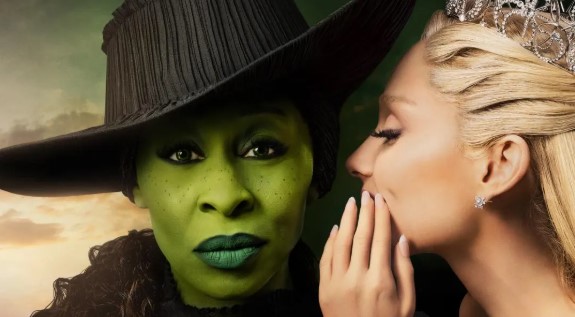When I was a teenager, I went to see the on-stage production of Wicked with the originators of the Glinda and Elphaba roles, Kristin Chenoweth and Idina Menzel. These two talented women, and a cast of talented singers, actors, and dancers had me singing the songs to myself and replaying the scenes on my head for weeks. Last week, I went to go see the movie adaptation with Cynthia Erivo and Ariana Grande. Despite all the hype, I tried to go in with expectations tempered. How could anything compare to the original? Walking out of the theater, however, it was clear that, while different, the movie was equally amazing.
Since the first opening curtain, people have interpreted the story of Elphaba and Glinda to find meaning and strength in their own lives. From a shunned child who finds her voice and purpose as she matures, to finding friendship and commonality in unexpected places, to even fighting against the forces of an unjust status quo – there are plenty of ways to find connection and inspiration in Wicked. Of course, we can do the same with the Torah.
This week’s parasha, Vayeshev, and the film adaptation of Wicked offer many parallels, particularly in their exploration of power, prejudice, and the complexities of human nature.
In both narratives, we are presented with characters who are marginalized due to their perceived differences. Joseph, as the favored son, is ostracized by his jealous brothers, while Elphaba, with her distinctive green skin, is shunned by society. Both are outsiders, forced to navigate a world that doesn’t (or even refuses to) understand or accept them.
In both stories we also see how understanding power dynamics is key to understanding people. Joseph’s rise to power in Egypt, and Elphaba’s growing influence and defiance against the Wizard, highlight the potential for individuals to overcome adversity and challenge the status quo. Both characters, in their respective contexts, use their intelligence, resilience, and unique abilities to gain power and influence.
Moreover, both narratives delve into the complexities of friendship and loyalty. Joseph’s relationship with his brother Benjamin, and Elphaba’s bond with Glinda, showcase the power of human connection to transcend societal and superficial divisions and personal differences. These relationships, though tested by pressures of community, family, and politics, ultimately serve as sources of strength and support.
Finally, the concept of morality and the blurred lines between good and evil are recurring motifs in both stories. Joseph’s brothers, while acting out of jealousy and resentment, are not inherently evil. Similarly, Elphaba, despite her reputation as the Wicked Witch of the West, is driven by a desire for justice and equality. Both narratives challenge us to consider the motivations behind actions and to question the simplicity of moral judgments.
By examining the parallels between Torah and Theater, Egypt and Oz, we gain a deeper appreciation for the universal themes that resonate across time and culture. Both Vayeshev and Wicked invite us to look deeper into our human condition, how power plays an unexpected role in the unfolding of our lives, and the enduring power of hope and redemption. May Joseph’s and Elphaba’s stories continue to educate and inspire us to become, like them, the best versions of ourselves.
Shabbat Shalom.

